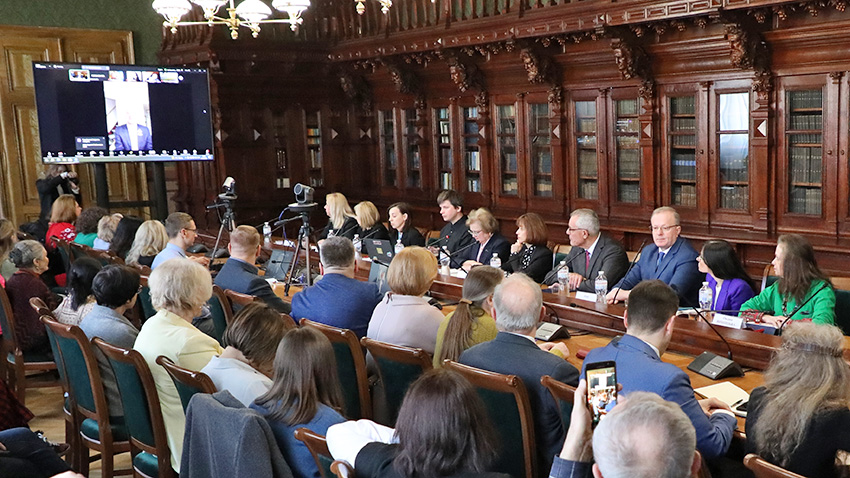On 21 March, the International Symposium «Ukrainian Education Abroad: Mission and Vision» was held under the auspices of the UWC International Educational Coordinating Council (IECC) in Zachariewicz Hall, Lviv Polytechnic National University.
To preserve identity
The International Institute of Education, Culture and Diaspora Relations (IECDR) organised and hosted this important event in the context of developing long-standing cooperation with the Ukrainian diaspora, particularly Ukrainian educators abroad. The purpose of the Symposium, moderated by Iryna Kliuchkovska, Director of the IECDR, was to discuss the problems of Ukrainian Saturday and Sunday schools in Europe and their role in preserving the national identity of a large number of children and youth forced to leave Ukraine due to the large-scale invasion of the Russian aggressor.
The Symposium was held in a hybrid format – offline and online (via Zoom). 266 people from 30 countries and Ukraine attended it.
Yurii Bobalo, Acting Rector of Lviv Polytechnic, welcomed the participants of the Symposium. The Professor expressed confidence that the event would give a new impetus to the discussion of topical issues of preserving the national identity of Ukrainians. He also paid tribute to the long-standing cooperation of the IECDR and the Ukrainian diaspora, in particular the Ukrainian schoolchildren abroad, to better understand the specifics of its problems outside mainland Ukraine.
In his address to the participants of the Symposium, the UWC Executive Director Dr. Roman Zyla emphasized that education is the foundation of the strength and capability of every nation. He also expressed gratitude to Lviv Polytechnic and IECDR for organising and hosting this important event – «the embodiment of the mission and vision in promoting Ukrainian education all around the world».
IECDR researchers Oksana Halaichuk, Oksana Horda, Nazar Danchyshyn and Oksana Trumko presented the results of the study «Ukrainian Saturday and Sunday Schools in Europe: Responses to the War Challenges» to the participants of the Symposium. Dozens of teachers of Ukrainian Studies Schools from the UK, Spain, Germany, Poland and the Czech Republic – the countries that, according to UN statistics, have received the largest number of Ukrainian migrants with children since the beginning of Russia’s full-scale war against Ukraine, became its respondents.
According to Zoriana Leniv, founder of the International Institute for Inclusion, the IECDR’s research has raised a number of issues, including the need to counteract Russian propaganda and bullying, family language policy and inclusive education.
Comprehensive analysis
The Symposium also featured a panel discussion entitled «Ukrainian Education Abroad: Mission and Vision», which focused on the issue of education as an outpost for preserving and strengthening Ukrainian national identity among Ukrainian children abroad, and thus on the vision of the future for Ukrainian education abroad, as well as on the role of the state of Ukraine and Ukrainian society in the development of this educational area.
The Honorary Consul of Canada to Ukraine Oksana Wynnyckyj-Yusypovych, Chair of the UWC International Educational Coordinating Council in 2008–2018; Professor Larysa Didkovska, Rector of the Ukrainian Free University; Marharyta Sytnyk, journalist, co-founder of the Holka civic initiative, manager of the Bridges of Ukraine project; Olha Shevchuk-Kliuzheva, Doctoral Candidate at the Department of Ukrainian Language at Borys Grinchenko Kyiv Metropolitan University; Liubov Liubchyk, Chair of the UWC International Educational Coordinating Council; and Oleh Paska, Director of the Department of Education and Science of the Lviv Regional Military Administration, took part in the discussion. The speakers provided a comprehensive analysis of the educational process of Ukrainian Saturday and Sunday Schools abroad in modern conditions, discussed topical issues of the functioning of the Ukrainian language in the world, examined the peculiarities of decolonisation processes in Ukrainian education abroad and proposed effective mechanisms to prevent the assimilation of Ukrainians in emigration.
During the panel discussion, Professor Larysa Didkovska outlined the stages of identity formation: «Being a Ukrainian is worthy! Being Ukrainian is fashionable!» Journalist Marharyta Sytnyk drew attention to the issue of «How to unite children of different waves of emigration in Ukrainian Saturday and Sunday School classes». Oksana Shevchuk-Kliuzheva, Doctoral Candidate at Borys Grinchenko Kyiv Metropolitan University, emphasised the relevance of family language policy, situational language policy and strict state language policy, while Oksana Wynnyckyj-Yusypovych, Honorary Consul of Canada in Ukraine, reminded that Ukrainian is on the way to being included in the list of official languages of the world, and called for comprehensive support for this.
Read more about other aspects of the event on the website of the International Institute of Education, Culture and Diaspora Relations.
